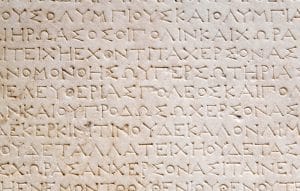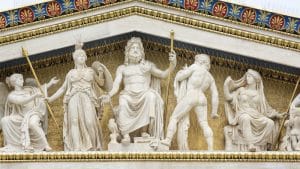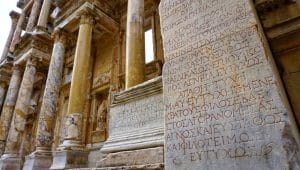National Greek Exam: Everything You Need to Know
The National Greek Exam (NGE) is a cornerstone in classical language education, offering a unique challenge to students in the US. As an annual event, it celebrates the rich heritage of Ancient Greek language and literature.
The exam represents a dedication to preserving and understanding a language that has profoundly influenced Western civilization. Students participating in the NGE immerse themselves in studying a language that is the root of many modern scientific, philosophical, and literary terms, providing them with a deeper understanding of the foundations of Western thought and language.
What Is the National Greek Exam?
The National Greek Exam, administered by the American Classical League (ACL), is an esteemed assessment for students in the United States studying Ancient Greek. It’s an annual event designed to assess students’ proficiency in Greek grammar, vocabulary, and syntax and their ability to read and translate passages from Greek literature.
High school students typically take the NGE but are open to learners at all levels of study. The exam is an opportunity to delve into the rich tapestry of Greek literature and culture, providing participants with a comprehensive understanding of Ancient Greece and its enduring legacy in the modern world.
What Is the Eligibility and Participant Demographics?
Eligibility for the National Greek Exam primarily focuses on middle and high school students, although the exam is open to students at any educational level studying Ancient Greek. These wide-ranging eligibility criteria reflect the NGE’s commitment to encouraging the study of Greek among diverse learners.
Regarding participant demographics, the NGE attracts a broad spectrum of students from various educational backgrounds, including those from public, private, and homeschool environments. The diversity of participants speaks to the widespread interest in Ancient Greek and the inclusive nature of the exam, which aims to make the study of this classical language accessible to all interested students.
How Can Students Register and Prepare for the NGE?
Registration for the National Greek Exam is a straightforward process, primarily managed by educators. Students interested in participating must typically register through their school or a designated Greek instructor.
The registration period for the NGE usually opens in early September and closes in mid-January. This timeframe allows students ample opportunity to sign up and prepare for the exams from late February to mid-March. Participants must watch these dates, as late registration might not be accommodated.
Registration Process and Deadlines
The students’ Greek language teachers or school administrators often facilitate the registration process for the National Greek Exam. The registration window typically opens on September 1st and extends until January 15th, providing a generous period for schools to organize and students to decide on their participation.
During this time, educators must gather student details, choose the appropriate level of examination for each student, and complete the registration formalities, including payment of exam fees. It’s important to adhere to these deadlines, as late entries may not be accepted, and missing them could mean waiting another year for the opportunity to participate.
Study Materials and Resources
A range of study materials and resources supports the National Greek Exam preparation. These include syllabi for different exam levels, vocabulary lists, and practice tests. The American Classical League, the organizing body of the NGE, provides access to past exam papers and other preparation materials on its website.
These resources are invaluable for understanding the format, content, and style of questions students can expect in the exam. Additionally, many schools and language tutors may offer specific preparation courses or study sessions, focusing on areas commonly assessed in the NGE.
Tips for Effective Preparation
Preparing for the National Greek Exam requires more than a good understanding of Ancient Greek; it demands a strategic and well-structured study approach. Effective preparation is key to achieving success with the exam covering a broad spectrum of topics, from vocabulary and grammar to the translation of literary passages. The following list will explore tips that can significantly enhance a student’s preparation for the National Greek Exam.
- Start Early and Create a Study Plan: Begin your preparation months in advance. Divide your study material into manageable sections and allocate time each day or week to cover specific topics. This approach prevents last-minute cramming and ensures comprehensive coverage of all necessary material.
- Focus on Vocabulary and Grammar: Dedicate time to memorizing essential vocabulary and understanding key grammatical structures. Create flashcards, use apps, or engage in vocabulary games. Regular practice and repetition will enhance your retention and understanding of Greek vocabulary and grammar.
- Practice with Past Papers: Utilize past exam papers to familiarize yourself with the format and types of questions asked. Time yourself while taking these practice exams to improve your speed and accuracy. Reviewing your answers against the provided answer keys or with a teacher can help identify areas where you need more focus.
- Join Study Groups or Seek Tutoring: Collaborating with peers in study groups can be beneficial. You can discuss challenging topics, quiz each other, and share learning strategies. If you need additional support, consider seeking a tutor specializing in Ancient Greek to guide you through difficult concepts.
- Utilize Online Resources and Tools: There are many online resources available, including educational websites, video tutorials, and interactive language apps. These can supplement your learning and provide diverse methods of engaging with the material.
- Regular Review Sessions: Schedule regular review sessions to review previously studied material. This helps in long-term retention and ensures that earlier topics remain fresh in your mind as you progress through your studies.
- Take Care of Your Well-being: While studying is important, so is your physical and mental health. Ensure you get enough sleep, eat healthily, and take breaks to relax. A well-rested and healthy mind is more receptive to learning and retaining information.
- Seek Feedback and Clarify Doubts: Don’t hesitate to ask teachers or knowledgeable peers for feedback on your progress. Clarify doubts or confusions immediately rather than letting them linger, as misunderstandings can hinder your learning process.
- Simulate Exam Conditions: Practice under conditions similar to the actual test as the exam approaches. This includes adhering to time limits and working in a quiet environment. This practice will help reduce anxiety and improve your performance on the actual exam day.
What Are the Costs and Logistics of the Exam?
The National Greek Exam is an esteemed evaluation that measures the proficiency of students in Ancient Greek, a language with deep historical and cultural roots. It is a highly sought-after examination in the United States, designed to gauge the learners’ understanding of the language’s syntax, grammar, and vocabulary.
Participants must be well-informed about the examination’s various costs, including registration fees, study materials, and other incidental expenses. Additionally, they need to be aware of the logistical details, such as the date, time, and location of the exam, as well as any specific guidelines and requirements they must adhere to.
Examination Fees
The cost structure of the National Greek Exam is bifurcated into different categories to accommodate various participant needs. The exam costs domestic participants $4.00 for digital and print copies. This fee structure is designed to make the exam accessible while covering the essential expenses of administering a national-level assessment.
The American Classical League (ACL), which administers the exam, also offers a discounted fee for its members, reflecting the organization’s commitment to promoting classical studies among a broad audience.
Shipping and Handling Details
In addition to the examination fees, there is a shipping charge involved. The standard shipping fee is $20.00 per order, which covers the delivery of the exams and any associated awards. This uniform shipping fee simplifies the process for participants, ensuring that all necessary materials are delivered efficiently and reliably.
For international participants, the exams are delivered in a different format, typically via email to the designated examiner in PDF format, thus facilitating participation from a global audience.
Answer Sheet Submission Guidelines
One critical logistics of the National Greek Exam is the submission of answer sheets. It is recommended that answer sheets be returned promptly, ideally postmarked on the exam day. However, to ensure that the answer sheets are included in the scoring process, they must be returned to the ACL office by March 24.
This guideline underscores the importance of timely submission to ensure that every participant’s efforts are duly recognized and evaluated. It also reflects the organized and structured approach of the ACL in managing a large-scale, national educational initiative.
What Types of Exams Are Offered in the NGE?
The National Greek Exam offers a range of exams catering to different proficiency levels in Ancient Greek. This variety ensures that students at all stages of their Greek language learning journey can participate and demonstrate their skills.
The exams are carefully structured to assess a broad spectrum of language competencies, from basic vocabulary and grammar to more advanced understanding of literary texts.
Introduction to Greek
The “Introduction to Greek” exam is designed for beginners and focuses on the foundational aspects of the Greek language. This exam typically includes basic vocabulary, fundamental grammatical structures, and simple translation exercises.
It serves as an excellent starting point for students new to Greek, allowing them to test and showcase their developing understanding of the language. The introductory exam is essential for those embarking on their journey in Greek studies, laying the groundwork for more advanced studies.
Intermediate and Advanced Exams
Students can opt for intermediate and advanced-level exams as they progress in their Greek studies. These exams are more challenging, encompassing a wider range of vocabulary, complex grammatical constructions, and demanding translation tasks.
They may include excerpts from classical Greek literature, requiring students to translate and demonstrate their comprehension of the texts. These exams are suited for students with a solid foundation in Greek and looking to deepen their understanding and proficiency.
Specialized Exams in Homeric and Attic Greek
The National Greek Exam offers Homeric and Attic Greek exams for students who wish to specialize further. These exams focus on the specific dialects and literary forms of these two significant periods in Greek history.
The Homeric Greek exams typically involve passages from the “Iliad” and the “Odyssey.” In contrast, the Attic Greek exams might include excerpts from the works of playwrights, historians, and philosophers from the classical period of Athens.
These specialized exams allow students to delve into the rich and varied literary heritage of Ancient Greece, challenging them to apply their language skills in a more focused and nuanced context.
How Does Participating in the NGE Benefit Students?
Participating in the National Greek Exam offers a range of benefits that extend beyond the immediate scope of language learning. These benefits contribute significantly to students’ personal, academic, and cultural development, offering them valuable experiences and opportunities.
Enhancing Language Skills
One of the primary benefits of participating in the National Greek Exam is enhancing language skills. Preparing for and participating in the exam requires an in-depth study of Ancient Greek, including its complex grammatical structures, extensive vocabulary, and rich literary texts.
This deep dive into the language improves students’ proficiency in Greek and enhances their overall linguistic abilities. Learning Ancient Greek, known for its precision and complexity, can help students better understand language mechanics, which can benefit learning other languages and honing their general communication skills.
Opportunities for Scholarships
The National Greek Exam also opens up scholarship opportunities for high-achieving students. These scholarships are often awarded based on the level of proficiency and excellence demonstrated in the exam.
For high school seniors, for instance, earning high honors in certain levels of the exam can qualify them for scholarships that support their further education, particularly in fields related to classical studies or languages. These scholarships not only provide financial support but also recognize and encourage academic excellence in the study of Ancient Greek.
Broadening Cultural and Historical Understanding
Another significant benefit of participating in the NGE is broadening cultural and historical understanding. The study of Ancient Greece is an exploration of the rich history and culture of Ancient Greece.
Students gain insights into Greek mythology, philosophy, history, and literature through the texts and materials studied for the exam. This deepened understanding of one of the foundational cultures of Western civilization enriches students’ educational experience, providing them with a more nuanced view of the world’s cultural and historical tapestry.
What Are the Scholarships Available Through NGE?
The National Greek Exam offers scholarship opportunities that significantly incentivize high school students to excel in their study of Ancient Greek. These scholarships are designed to recognize and support students who demonstrate outstanding proficiency in the exam, particularly in specific categories.
Eligibility for the Scholarship
Eligibility for the National Greek Exam scholarship is primarily focused on high school seniors. In 2024, students who earn purple or blue ribbons in the Attic Prose exam can apply for the scholarship.
This criterion highlights the emphasis on not just participation but also excellence in the understanding and application of Ancient Greek, particularly in the prose form. Awarding ribbons based on performance underlines the competitive and meritocratic nature of the scholarship.
Scholarship Amount and Renewability
The scholarship offered through the National Greek Exam is both generous and renewable, making it a substantial aid for the further educational aspirations of the recipients. For 2024, the scholarship amount is $2,000, renewable for four years.
This renewability factor underscores the commitment to supporting students at a single point in their educational journey and throughout their undergraduate studies, provided they continue to meet the necessary criteria.
Application Process for the Scholarship
As of now, detailed information about the application process for the National Greek Exam scholarship in 2024 is not readily available. However, such scholarships would require candidates to apply, including academic transcripts, proof of their performance in the NGE, and possibly additional materials such as essays or letters of recommendation.
The application process is designed to assess not only the academic achievements of the students but also their commitment to the study of Greek and their potential for future academic success.
Why Is Learning Greek Important and Beneficial?
Learning Greek, particularly in the context of the National Greek Exam, offers profound benefits beyond mere language acquisition. The study of Greek language and literature provides insights into the roots of Western civilization, influences contemporary vocabulary and thought, and enriches our understanding of historical and cultural contexts.
Influence on English Vocabulary
A significant portion of English vocabulary – about 25% – is derived from Greek. This influence is not limited to specialized fields like science, medicine, and philosophy but is evident across the general lexicon.
Learning Greek, therefore, equips students with a deeper understanding of English vocabulary, enabling them to grasp the etymology of words and appreciate the nuances of language. This knowledge is academically enriching and practical, enhancing verbal and written communication skills critical for various professions and disciplines.
Insights into Western Art and Culture
The Greek language is key to unlocking a vast treasure of Western art and culture. Ancient Greece is renowned for its monumental contributions to various art forms, including literature, theater, sculpture, and architecture.
These cultural artifacts, embodied with philosophical, political, and ethical ideas, have shaped Western civilization. By learning Greek, students gain direct access to classical texts and works of art in their original language, allowing for a more authentic and nuanced understanding of these cultural milestones.
This understanding fosters a deeper appreciation of how historical narratives and cultural values have evolved and influenced contemporary society.
Historical and Literary Significance of the Greek Language
The historical and literary significance of Greece is monumental. As the language of Plato, Aristotle, Homer, and many other luminaries, Greek has been a medium for some of the world’s most influential texts.
These works laid the foundation for Western philosophy, science, and literature, offering timeless insights into human nature and the world. The study of Greek thus connects students with these foundational texts, enabling them to engage directly with the ideas and narratives that have shaped human thought and civilization.
This engagement enriches students’ intellectual lives and equips them with critical thinking and analytical skills, valuable in any academic or professional pursuit.
How Does the NGE Promote the Study of Ancient Greek?
The National Greek Exam (NGE) plays a pivotal role in promoting the study of Ancient Greek, a cornerstone of classical education. Through its comprehensive structure and widespread recognition, the NGE encourages students to delve into the language, fostering a deeper appreciation and understanding of this foundational element of Western civilization.
Fostering Interest in Classical Languages
The NGE fosters interest in classical languages, especially among young learners. By providing a structured and challenging framework, it encourages students to engage with Ancient Greek in a meaningful way.
The exam’s design, encompassing various proficiency levels, makes it accessible to many students, from beginners to more advanced. This inclusive approach helps demystify the language, making it more approachable and interesting for students who might otherwise be intimidated by its complexity.
Supporting Academic Excellence in Greek Studies
A key objective of the NGE is to support academic excellence in Greek studies. The exam sets high language competence standards, encouraging students to understand Greek grammar, vocabulary, and syntax thoroughly.
By recognizing and rewarding high achievement in these exams, the NGE motivates students to strive for excellence in their Greek studies. This pursuit of excellence benefits students in their personal and academic growth and contributes to the broader field of classical studies.
Encouraging Wider Participation in Greek Language Learning
The NGE is also vital in encouraging wider participation in Greek language learning. By offering a platform where students from various educational backgrounds can demonstrate their skills, the NGE promotes the inclusivity of Greek language study.
It allows students needing access to specialized Greek language instruction in their regular school curriculum to explore and develop their interest in the language. This broader participation helps ensure the continuation and growth of Ancient Greek studies, preserving its relevance in modern education.
What Are the Different Levels of the NGE?
The National Greek Exam offers a structured and tiered approach to assessing students’ proficiency in Ancient Greek. These levels cater to a wide range of learners, from those just beginning their journey in Greek studies to those with a more advanced understanding of the language.
Introduction and Beginning Levels
The introductory and beginning levels of the National Greek Exam are tailored for students who are new to the language. These levels focus on fundamental aspects of Greek, such as basic vocabulary, essential grammatical structures, and simple translation exercises.
These exams are designed to be accessible to beginners, providing a supportive and encouraging environment for students to demonstrate their initial grasp of Ancient Greek. These levels are critical in building a solid foundation in the language, paving the way for more advanced studies.
Intermediate and Advanced Levels
As students progress in their Greek studies, they can advance to the intermediate and advanced levels of the NGE. These levels present more challenging material, including a broader range of vocabulary, complex grammatical constructions, and translation of more sophisticated texts.
These exams test a deeper understanding of the language and its literary forms. They are suitable for students with a strong foundation in Greek and looking to further their proficiency and comprehension of the language.
Special Categories: Homeric and Attic Greek
In addition to the standard levels, the National Greek Exam offers specialized categories in Homeric and Attic Greek. These categories allow students to focus on the specific dialects and literary forms from these distinct periods of Greek history.
The Homeric Greek exams typically include passages from works like the “Iliad” and the “Odyssey,” while the Attic Greek exams might feature texts from classical Athenian literature. These special categories allow students to delve deeper into the rich and varied literary heritage of Ancient Greece, challenging them to apply their language skills in more specific and nuanced ways.
How Is the NGE Structured and Scored?
The National Greek Exam is meticulously structured and scored, offering a comprehensive assessment of students’ proficiency in Ancient Greek. This structure and scoring system are designed to fairly and accurately evaluate the knowledge and skills of participants across various levels of learning.
Format of the Examination
The format of the National Greek Exam varies depending on the level and category of the exam. Generally, the exam includes sections on vocabulary, grammar, and translation. Lower levels focus primarily on basic vocabulary and simple sentences, while higher levels involve complex translations and interpretations of Greek texts.
The format is crafted to progressively challenge students, with each level building on the skills assessed in the previous ones. This step-by-step approach allows students to demonstrate their understanding and proficiency in a structured and gradual manner.
Scoring Criteria and Methods
The scoring criteria and methods of the National Greek Exam are designed to assess students’ abilities in Greek objectively. Exams are typically scored on a scale that reflects the accuracy and proficiency of the student’s responses.
The criteria include the correct use of vocabulary, the application of grammatical rules, and the ability to translate and interpret Greek passages accurately. Each exam section contributes to the overall score, particularly emphasizing the translation and interpretation sections at the higher levels, reflecting the complexity and depth of understanding required at these stages.
Recognition and Awards for High Scorers
High scorers in the National Greek Exam are recognized and awarded for their outstanding performance. These awards often come in certificates, ribbons, or medals, depending on the level of achievement. The highest achievers may receive special honors, signifying their exceptional proficiency in Ancient Greek.
These awards serve not only as a recognition of academic excellence but also as an encouragement for further study and exploration of the language. They highlight the value and prestige associated with high achievement in the National Greek Exam, motivating students to strive for excellence in their Greek studies.
What Resources Are Available for NGE Preparation?
For students preparing for the National Greek Exam, various resources are available to enhance their study and understanding of Ancient Greek. These resources are designed to provide comprehensive support and guidance, covering the various aspects of the exam.
Official Study Guides and Syllabi
The official study guides and syllabi for the National Greek Exam are invaluable resources for students. These guides provide detailed information about the content and structure of the exam, including the specific areas of focus for each level.
The syllabi typically outline the vocabulary, grammatical structures, and types of passages that students can expect, allowing them to tailor their studies accordingly. By utilizing these official guides, students can ensure that they are covering all the necessary material and are well-prepared for the format and challenges of the exam.
Previous Year Exam Papers
One of the most effective ways to prepare for the National Greek Exam is by practicing with the previous year’s exam papers. These papers give students a clear idea of the type of questions typically asked, the difficulty level, and the exam format.
Working through past papers allows students to test their knowledge and skills in a realistic setting, helping them to identify areas where they need further study or practice. Additionally, analyzing these papers can provide insights into common themes and recurring exam topics, aiding in more focused and efficient preparation.
Online Resources and Tutoring Options
In addition to official study materials, numerous online resources are available for students preparing for the National Greek Exam. These include educational websites, video tutorials, interactive quizzes, and language learning apps specifically designed for Ancient Greek.
Many of these resources offer innovative and engaging ways to learn and practice the language, catering to different learning styles and preferences. For students seeking more personalized assistance, tutoring options are also available. Professional tutors can provide targeted support and guidance, addressing specific challenges and helping students to build confidence in their language skills.
How Can Educators and Schools Support Students in the NGE?
Educators and schools are pivotal in supporting students preparing for the National Greek Exam. Their support can significantly enhance the student’s learning experience and performance in the exam.
Integrating NGE Preparation in Curriculum
Incorporating NGE preparation into the school curriculum is an effective way for educators to support students. By aligning the teaching of Ancient Greek with the requirements of the NGE, educators can ensure that students are comprehensively prepared for the exam.
This integration can include dedicated class time for NGE topics, including vocabulary, grammar, and translation exercises that mirror those found in the exam. Such integration prepares students for the NGE and enriches their understanding of Ancient Greek.
Organizing Study Groups and Workshops
Schools can also support students by organizing study groups and workshops on NGE preparation. Study groups provide a collaborative environment where students can learn from each other, discuss challenging topics, and share study strategies.
Workshops, led by experts or teachers proficient in Ancient Greek, can offer intensive learning sessions focusing on specific aspects of the exam. These group settings can also help build a community of learners, making the preparation process more engaging and less daunting.
Guidance for Registration and Participation
Educators and schools are instrumental in guiding students through registration and participation in the National Greek Exam. This guidance is crucial as it helps students navigate the administrative aspects of the exam and ensures that they are well-prepared and informed about the requirements and procedures.
- Understanding the Registration Process: Educators can assist students by providing clear information about the registration process for the National Greek Exam. This includes details on deadlines, fees, and how to register. Schools can organize informational sessions or provide written guides to ensure students and their parents are well-informed about these procedures.
- Selecting the Right Exam Level: Educators must guide students in selecting the appropriate exam level that matches their proficiency in Ancient Greek. This involves assessing the student’s current level of understanding and advising them on the most suitable exam category, ensuring they are both well-rested and well-rested.
- Preparation and Study Planning: Educators can help students plan their study schedules, identifying key areas to focus on based on the NGE structure. This can involve setting realistic goals, providing study materials, and offering regular feedback on their progress. Schools can also help by creating a supportive study environment, offering resources like a quiet study space or access to additional learning materials.
How Can Students Leverage Their NGE Experience for Future Opportunities?
Participating in the National Greek Exam opens many student opportunities. The skills and knowledge acquired and the recognition earned can be leveraged in various ways to enhance future academic and professional prospects.
Including NGE Participation in College Applications
Including participation and achievement in the National Greek Exam in college applications can significantly bolster a student’s profile. Colleges and universities often look for candidates who demonstrate a commitment to academic excellence and a passion for learning, qualities that NGE participation exemplifies.
High performance in the NGE, especially when coupled with ribbons or awards, showcases a student’s proficiency in a challenging subject, setting them apart in a competitive admissions landscape. It also indicates a willingness to engage with complex and culturally significant subjects, a highly valued trait in higher education.
Career Opportunities Related to Greek Studies
Success in the National Greek Exam can also open doors to various career opportunities, particularly in fields related to classical studies, linguistics, history, archaeology, and more. Proficiency in Ancient Greek is a rare and valued skill that can be advantageous in academic research, museum work, and roles in cultural institutions.
Additionally, the analytical and critical thinking skills developed through the study of Greek are transferable and highly sought after in numerous fields, including law, diplomacy, and international relations.
Networking and Community Involvement Through NGE
Participation in the National Greek Exam also provides opportunities for networking and community involvement. Students may connect with peers with similar interests in classical languages and cultures, leading to lasting academic and professional relationships.
Furthermore, the NGE community often includes educators, scholars, and professionals in classical studies, providing students with mentorship and guidance. These connections can be invaluable for academic advancement and career development, offering insights into further studies and potential career paths in Greek studies and beyond.
Ready to Elevate Your College Application with AdmissionSight?
Are you aiming to transform your National Greek Exam achievements into a standout college application? AdmissionSight is here to guide you! Our expertise in college admissions consulting can help you effectively showcase your accomplishments in the National Greek Exam and beyond.
We understand the intricacies of college admissions and are committed to helping you highlight your unique strengths, including your proficiency in Ancient Greek. Let us assist you in crafting a compelling application that resonates with top colleges and universities. Take the first step towards your dream college – Contact AdmissionSight today and unlock your potential.














































